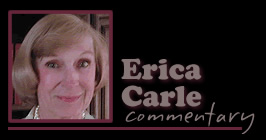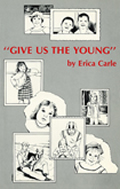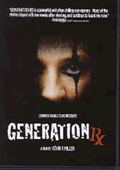PART 1
Erica Carle
September 5, 2010
NewsWithViews.com
Who is in charge of efforts to bring about a "New World Order?" It is not George Soros! No matter how much money and influence George has, he never could be the chief organizer. He is part of it, but much more is needed than a single individual with a plan and unlimited resources.
What is needed is an organization that reaches into every country, has the sanction and cooperation of governments, has unlimited national and international contacts, and the respect and support of millions of ordinary citizens who do not really understand what they are doing or where the organization is leading them. I submit that the chief organizing body for the New World Order is the Chamber of Commerce.
There are millions of Chamber of Commerce members in communities all over the world. They promote their own communities, welcome visitors, help promote local businesses, and sometimes perform community services. They also try to influence legislation.
In the United States the many Chambers of Commerce were mostly separate organizations until 1912. Change began in December 1911 when President Taft suggested to Congress that an association of Chambers of Commerce would be of great value in supporting American interests. [1]
Then in January 1912 Senator Knute Nelson of Minnesota spoke in the Senate saying:
"I received this morning a telegram from a Chamber of Commerce in my state urging me to vote against the bill now before us. This afternoon I received a telegram from another business organization asking me to vote for it. What does business really think?"
On March 1, 1912 President Taft issued a call for a conference of commercial and trade organizations and directed Charles Nagel, Secretary of Commerce and Labor to make arrangements. The conference was held April 22, 1912. Seven hundred representatives of 392 commercial and industrial organizations attended.
At the conference Secretary Nagel said:
"It has been suggested not only that you organize so as to have a common commercial opinion to submit to the Government, but that you get the sign of authority in the shape of a national charter which will enable every officer of the Government to say –'This is the recognized representative of the commerce and industry of the United States'."
On June 4, 1912 a bill giving the Chamber of Commerce of the United States a federal charter was reported by the Judiciary Committee of the House with the recommendation that the bill be passed.
The Chamber of Commerce of the United States did become the recognized representative of commerce and industry. Harry A. Wheeler of Chicago was elected the first President. Thereafter legislators and presidents dutifully listened to and complied with legislative recommendations of the Chamber of Commerce of the United States, a blanket organization the government itself helped to create.
January 14, 1913 the National Chamber membership voted for a national budget system.
June 10, 1921 Congress passed a law creating a national budget system.
On August 25, 1913 President Wheeler and a Chamber committee urged before the Senate Banking and Currency Committee the establishment of a Federal Reserve System.
On December 23, 1913 the Federal Reserve Act was passed.
April 14, 1914 the Chamber by referendum vote recommended creation of Federal Trade Commission.
September 26, 1914 Federal Trade Commission Act passed.
November
15, 1915 Chamber recommends an International Court of Justice or Council
of Conciliation.
In 1916 Congress approved Federal Highway Policy conforming to Chamber
declarations.
January 17, 1917 – Chamber members, by referendum, urged federal legislation permitting cooperative agreements, under federal supervision, for conservation of natural resources.
On April 4, 1917 President Wilson told Congress, "World must be made safe for democracy." April 6 war with Germany was declared.
In 1917 the Chamber organized more than 400 War Service Committees, representing as many industries, functioning under War Service Executive Committee of Chamber and cooperating with Council of National Defense.
In 1917 the Chamber voted for heavily increased taxes to lessen government borrowing and avoid inflation.
Also in 1917 Chamber members voted for an excess-profits tax as a source of war revenue.
On October 17, !919 an International trade conference paved the way for organization of an International Chamber of Commerce in Paris the following year.
After 1920 hometown chambers of commerce had a new blanket organization, the International Chamber of Commerce, over a blanket organization, the Chamber of Commerce of the United States, over thousands of hometown chambers and chamber members.
April 27-29, 1920 – "Suitable agricultural organizations" were invited to join the Chamber.
In May 1922 the Chamber advocated adherence to Court of International Justice as a means of promoting peaceful settlement of international disputes. The Chamber made this recommendation earlier on November 15, 1915.
February 9, 1923 - The Chamber declared itself against a federal department of education and against federal aid for common school education.
In August 1923 the Chamber set up an agricultural bureau giving increasing attention to agricultural conditions.
1924 – National Forestry Act passed in general agreement with Chamber recommendations.
1925 - Chamber supports legislation to increase salaries of all federal judges. Legislation was enacted in 1926.
May 8-11, 1928 – Chamber affirms faith in 3 separate divisions of government. "Any effort by the legislative branch to usurp or limit functions of the judiciary must result in disaster."
January 10, 1930 – Membership supports Federal Reserve System
| Subscribe to the NewsWithViews Daily News Alerts! |
Collaboration
on legislation between the U. S. Chamber of Commerce and the U. S. Government
was becoming habitual. It is assumed that the recommendations of the Chamber
of Commerce of the United States trump the opinions of any hometown chambers
or any individual members.
Chamber of Commerce influence over legislation has increased as its membership
has grown. Part two coming soon.
[Read Erica Carle's books: Why Things Are The Way They Are. and "Give Us The Young"]
Click here for part -----> 1, 2,
Footnotes:
1, Quotes and information on the C of C from 1911 to 1930 are from These Tremendous Years 1912-1937 by Neil M. Clark as researched by Amber Clark, and published in MILWAUKEE COUNTY NEWS April 10 & 24, 1975.
� 2010 Erica Carle - All Rights Reserved
Sign
Up For Free E-Mail Alerts
E-Mails are used strictly for NWVs alerts, not for
sale
Erica Carle is an independent researcher and writer. She has a B.S. degree from the University of Wisconsin. She has been involved in radio and television writing and production, and has also taught math and composition at the private school her children attended in Brookfield, Wisconsin. For ten years she wrote a weekly column, "Truth In Education" for WISCONSIN REPORT, and served as Education Editor for that publication.
Website: EricaCarle.com
E-mail: hist.detective@yahoo.com











 Share
This Article
Share
This Article






